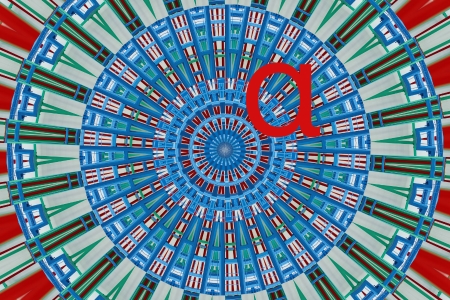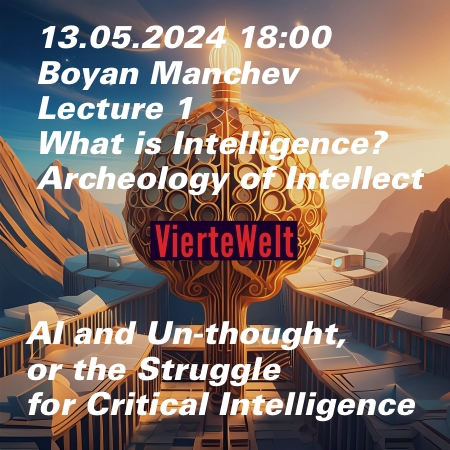
Boyan Manchev // WHAT IS INTELLIGENCE?
Philosophie
– AI and Un-thought, or the Struggle for Critical Intelligence –
Mo.13.05.24 | 18:00 – 20:00 Uhr
lecture 1
What is Intelligence? Archeology of Intellect
Chapter 1: What thinks what, and why? (18:00 – 19:00)
Chapter 2: The Drive of Thinking (19:00 – 20:00)
scroll down for german
What is intelligence? Is intelligence the capacity to think? What does it mean to think? Who thinks? Or what? Why, and – what for? Why thought? Why intelligence?
In order to debunk contemporary myths of intelligence and outplay the arrogance of oversimplifications, we will engage in a philosophical archeontology, attempting to shed light on the historical, structural and functional conditions of the emergence of the concepts of intellect and intelligence, focusing on the motor of thought.
The legacy of Abū al-Walīd Muḥammad ibn Aḥmad ibn Muḥammad ibn Rushd – the philosopher from Almohad Córdoba, better known as Averroës or the Commentator – will have crucial place in this chancy journey.
AI and Un-thought, or the Struggle for Critical Intelligence
Opening
Today the struggle over the future appears as struggle over intelligence.
Тhe media infatuation with artificial intelligence is above all a sign of the decline of intelligence as such, which leaves a vertiginous existential void. Confronting this void is the urgent task of critical intelligence today.
To put it bluntly: Why should ignoramuses decide on what is intelligence? Why those with no imagination should be the ones who attempt to monopolise the future? The answer is simple. Only ignorants could strive to program intelligence. Those who try to monopolise intelligence as the production engine of the future, are not even trying to understand what intelligence is. The eloquent preachers of radical transformations do not even reflect on what they pretend to transform.
Here I propose to shift the hegemonic perspective imposed on us and to open instead another horizon of questioning, and therefore another horizon of struggle.
Hence, what is intelligence?
Despite advances in cognitive and neuroscience, or the successful speculations of psychoanalysis and the philosophy of language, the old philosophical question of what it means to think seems to be as vaguely and ambiguously answered as it was on the eve of the crisis of metaphysical systems dedicated to the eternal and universal intellect.
Today we are confronted with a technological takeover of the cognitive faculties – more than that, the entire potential and actuality of psychic life is becoming a matter of control, of enclosed (re)production, and thus of exploitation. Isn’t what media-political and technological discourses today call “intelligence” the subjugation of the thought process to quantifiable criteria and a (pseudo-)objective measurement (and thus its reduction to the assumption of efficiency, exchangeability, and capitalization)? What else is the so-called Artificial Intelligence if not the ultimate dream of capital: the new embodiment of the age-old capitalist fantasy of not only commodifying all spheres of existence, including life forms (human and non-human), but also reducing immaterial and hitherto unquantifiable psychic (affective and cognitive) forces to quantifiable and therefore producible and controllable series of operations?
In the face of this massive unthought critical thinking has the task of asking the untimely question: What is intelligence? What does it mean to think? Who or what thinks, and why?
Lecture 2 + 3 coming soon:
lecture 2
The Raise and Fall of Transhumanism
Monday 17 June 2024 (18:00 – 20:00)
Chapter 3: “Natural” vs. “Artificial” Intelligence (18:00 – 19:00)
Chapter 4: Who is afraid of Intelligence? (19:00 – 20:00)
lecture 3
Cosmic Intelligence
Tuesday 18 June 2024 (18:00 – 20:00)
Chapter 5: Future Gods and Weather Demons
Chapter 6: Cosmic Intelligence
german version
Vorlesung 1
Was ist Intelligenz? Archäologie des Intellekts
13. Mai 2024, 18:00 – 20:00
Kapitel 1: Was denkt was, und warum? (18:00 – 19:00)
Kapitel 2: Der Antrieb des Denkens (19:00 – 20:00)
Was ist Intelligenz? Ist Intelligenz die Fähigkeit zu denken? Was bedeutet es, zu denken? Wer denkt? Oder was? Warum, und – wozu? Warum Denken? Warum Intelligenz?
Um die zeitgenössischen Mythen über Intelligenz zu entlarven und die Arroganz der Vereinfachung zu überspielen, werden wir eine philosophische Archäologie betreiben und versuchen, die historischen, strukturellen und funktionalen Bedingungen der Entstehung der Begriffe Intellekt und Intelligenz zu erhellen, wobei wir uns auf den Motor des Denkens konzentrieren.
Das Vermächtnis von Abū al-Walīd Muḥammad ibn Aḥmad ibn Muḥammad ibn Rushd (*1126) – dem Philosophen aus dem almohadischen Córdoba, besser bekannt als Averroës oder der Kommentator – wird einen entscheidenden Platz in dieser gewagten Reise einnehmen.
KI und Un-Sinn, oder Der Kampf für kritische Intelligenz
Gegenwärtig erscheint der Kampf um die Zukunft als Kampf um die Intelligenz.
Die mediale Besessenheit von künstlicher Intelligenz ist vor allem ein Zeichen für den Niedergang der Intelligenz als solcher, der eine schwindelerregende existenzielle Leere hinterlässt. Dieser Leere entgegenzutreten ist die dringende Aufgabe der kritischen Intelligenz von heute.
Warum überlassen wir es Ignoranten darüber zu entscheiden, was Intelligenz ist? Warum sollten diejenigen, die keine Phantasie haben, diejenigen sein, die versuchen, die Zukunft zu monopolisieren? Die Antwort ist einfach. Nur Unwissende können danach streben, Intelligenz zu programmieren. Diejenigen, die versuchen, die Intelligenz als Produktionsmotor der Zukunft zu monopolisieren, versuchen nicht einmal zu verstehen, was Intelligenz ist. Die wortgewandten Prediger radikaler Transformationen denken nicht einmal darüber nach, was sie vorgeben zu transformieren.
Ich schlage vor, die uns aufgezwungene hegemoniale Perspektive zu verschieben. Eröffnen wir einen anderen Horizont des Kampfes mit der Frage “Was also ist Intelligenz?”
Trotz der Fortschritte in den Kognitions- und Neurowissenschaften oder der erfolgreichen Spekulationen der Psychoanalyse und der Sprachphilosophie scheint die alte philosophische Frage, was es bedeutet zu denken, genauso vage und unklar beantwortet zu sein wie am Vorabend der Krise der metaphysischen Systeme, die sich dem ewigen und universellen Intellekt verschrieben hatten.
Heute sind wir mit einer technologischen Übernahme der kognitiven Fähigkeiten konfrontiert – mehr noch, das gesamte Potential und die Aktualität des psychischen Lebens wird zu einer Angelegenheit der Kontrolle, der geschlossenen (Re-)Produktion und damit der Ausbeutung. Ist das, was medienpolitische und technologische Diskurse heute als “Intelligenz” bezeichnen, nicht die Unterwerfung des Denkprozesses unter quantifizierbare Kriterien und eine (pseudo-)objektive Messung? Wird diese “Intelligenz” damit auf Kriterien der Effizienz, Austauschbarkeit und Kapitalisierung reduziert? Was sonst ist die so genannte Künstliche Intelligenz, wenn nicht der ultimative Traum des Kapitals: die neue Verkörperung der uralten kapitalistischen Phantasie, nicht nur alle Sphären der Existenz, einschließlich der Lebensformen (menschlich und nicht-menschlich), zu Waren zu machen, sondern auch immaterielle und bisher nicht quantifizierbare psychische (affektive und kognitive) Kräfte auf quantifizierbare und damit produzierbare und kontrollierbare Operationsreihen zu reduzieren?
Angesichts dieses massiven Un-denkens hat das kritische Denken die Aufgabe, die unzeitgemäße Frage zu stellen: Was ist Intelligenz? Was bedeutet es, zu denken? Wer oder was denkt, und warum?
Boyan Manchev (1970, Sofia) is a philosopher and writer, professor at the New Bulgarian University in Sofia, former Director of Program and Vice-President of the International College of Philosophy in Paris and former Professor at HZT–UdK Berlin. Among his books are Freedom and World. Transcendental Philosophy and Modal Ontology (2023), What is Ontology? (with Dimitar Vatsov, 2023), The End of Contemporary Art? Or the Future of Art (2023), Freedom in spite of Everything (2021), The New Athanor. Prolegomena to Philosophical Fantastic (2020), Clouds. Philosophy of the Free Body (2017), Logic of the Political (2012), Miracolo (2011), L’altération du monde (2009), La Métamorphose et l’instant – Désorganisation de la vie (2009), The Body-Metamorphosis (2007), The Unimaginable (2003). The perspective of a new ontology of existence, or a modal ontology, and the search for new philosophical forms have been central to his work in the past twenty-five years.

Image created by Artificial Intelligence Firefly by Adobe
